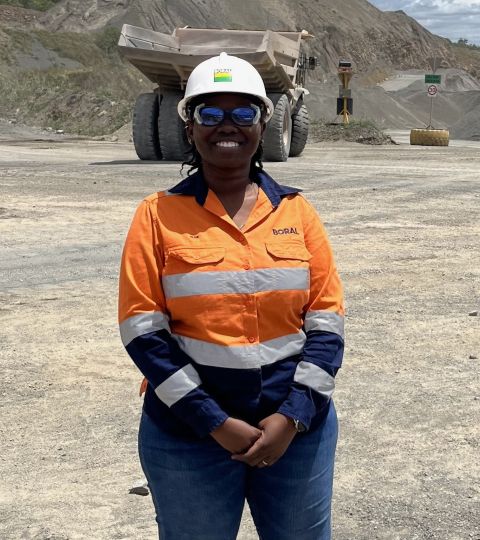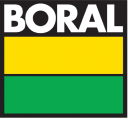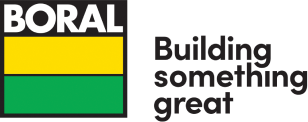Technical Specialist - Boral Quarries

Tell us a bit about yourself, Elsie.
I’m a Materials Scientist/ Engineer. I studied at Wesley Girls’ High School in Cape Coast, Ghana, where I majored in science and undertook elective courses in chemistry, biology, physics and mathematics. After high school, I earned a four year bachelor's degree with honours in Materials Engineering at Kwame Nkrumah University of Science and Technology (KNUST), Ghana. Being ranked as the best performing female student in my graduating materials engineering class, I was offered a one-year role as a Teaching and Research assistant at KNUST, after graduation. Towards the end of this appointment, I was awarded an ANSTI‑DAAD scholarship to study masters in Metallurgy at Tshwane University of Technology in South Africa.
After completing my masters in March 2017, I was granted a funded PhD position in the Faculty of Engineering and IT (FEIT) at the University of Technology Sydney (UTS) in July 2017. My PhD research was focused on concrete materials, and this is where I was exposed to the construction materials industry and had the opportunity to work closely with Boral MTS in Baulkham Hills. In 2021, after completing my PhD, I joined the Boral innovation factory as a Research Engineer at the UTS-Boral Centre for Sustainable Building in Botany. A year later, I relocated to Queensland to start in my current role with Boral Technical Services.
What does a day in the life of Elsie involve?
Well, no two days are ever the same in this role and for me that’s what makes it exciting. To describe a single day would be atypical of what the role truly involves. Some days you would find yourself responding to product queries from project and site engineers, whereas on other days you are on the road making technical visits to the quarries, visiting contractors and troubleshooting challenging issues on site. As my manager likes to say, “getting your boots dirty”.
If I had to pick five major activities my role involves, I would say, optimising mix designs for plant-mixed bound road base materials including foamed bitumen, stabilised pavements and cement treated road base, reviewing project specific technical documents against various quarry source properties to nominate suitable quarry products for construction, engaging in statistical pit mapping of quarries to establish the correlation between specific geological conditions and rock properties, ensuring quality assurance and control of quarry products, and performing troubleshooting and root cause analysis of nonconforming quarry products.
Who has been most influential in supporting /shaping your career?
When I was at high school, my role model was Marie Curie. That influenced my decision to pursue a career in the physical sciences rather than biological. As I progressed in my academic and work career, I have received valuable counsel at every stage from many people including my parents (who were both teachers) along with my academic supervisors and professional networks. All their advice has contributed to what my career is today. To be honest, to pick the most influential would be a truly arduous task..
Reflecting on the leaders you have worked with in your academic and work career to date, how have they shaped /influenced your career experiences? Do you have any advice to leaders out there on how to support the careers of women in science?
I have been blessed to work with, in my opinion, some of the best leaders one could ask for. So far, all the leaders I have worked with are men and they have been collaborative, empathetic, yet still very assertive and strategic with decisive and action-oriented leadership traits. My experiences with them have shaped several aspects of my soft and hard skills contributing to my career. For example, my undergraduate supervisor encouraged my unconventional research interest and motivated me to succeed in my undergraduate project which I carried out on my own, while my course mates worked in groups. This nurtured my creative thinking ability and the findings from that work led to my first peer-reviewed journal paper publication.
Throughout my PhD, my supervisors supported me academically and financially to participate in research showcases, workshops, seminars, conferences and technical meetings. That was an opportunity that most students did not have, and it allowed me to hone my communication skills. I was also exposed to key players in academia and industry during these gatherings enabling me to showcase my skills to potential research collaborators and employers, including Boral.
In my current role, I’m discovering new skills I didn’t know I had, and working to overcome some of my weaknesses under the dedicated and supportive leadership of my manager. He is very practical, values my opinions, and takes the time to know my working style and personal values. He enquires about my career goals and how he can help me achieve them. I believe these are traits every woman hoping to pursue a career in science will appreciate in a leader.
What aspect of your role are people often surprised/fascinated to hear more about?
Most people are often interested in hearing about some of the complex technical issues I have encountered in this role and the approach taken to resolve them.
(For women in Science) Most of the people in every room you enter will be men and sometimes expectations might be set lower for you as a woman. This can be intimidating; but, let that create an opportunity for you to stand out and make a long-lasting impression by showcasing your skills.
If you were to share some advice to other women considering a career in science – what would you say to them? Why should they join the field and consider a career in science?
I would say “Go for it!”. Women remain underrepresented in the STEM fields due to unhelpful stereotypes about our intellectual ability and our capability to withstand taxing scenarios. My advice is, if you have a propensity for curiosity and the desire to improve the lives of people and the environment, then you will find a career in science most rewarding.
Granted, it may be challenging because occasionally it will appear a bit difficult to balance work and the additional responsibilities in your personal life. Some disciplines in science (and engineering) are still considered male dominated professions, therefore, most of the people in every room you enter will be men and sometimes expectations might be set lower for you as a woman. This can be intimidating; but, let that create an opportunity for to stand out and make a long-lasting impression by showcasing your skills because you can bet you will not be overlooked.
What is the most rewarding aspect of your role?
The most rewarding aspect of my role is brainstorming with my team to find the root cause of a major problem and corrective measures that comply with the relevant state and project specifications. Seeing the team work together towards the same goal and exchange ideas makes me feel trusted, appreciated and valued.
What are you most looking forward to achieving/experiencing in your career? What does the future hold for you?
At the moment, I am looking forward to establishing career stability and professional development by undertaking training sessions and courses that are relevant to this role. I am focusing on gaining more experience, developing new skills that are abreast with advancements in technology and codes of practice in the industry, and building my personal brand. In future, I hope to advance to a leadership position and be equipped to support other women and girls in science.

